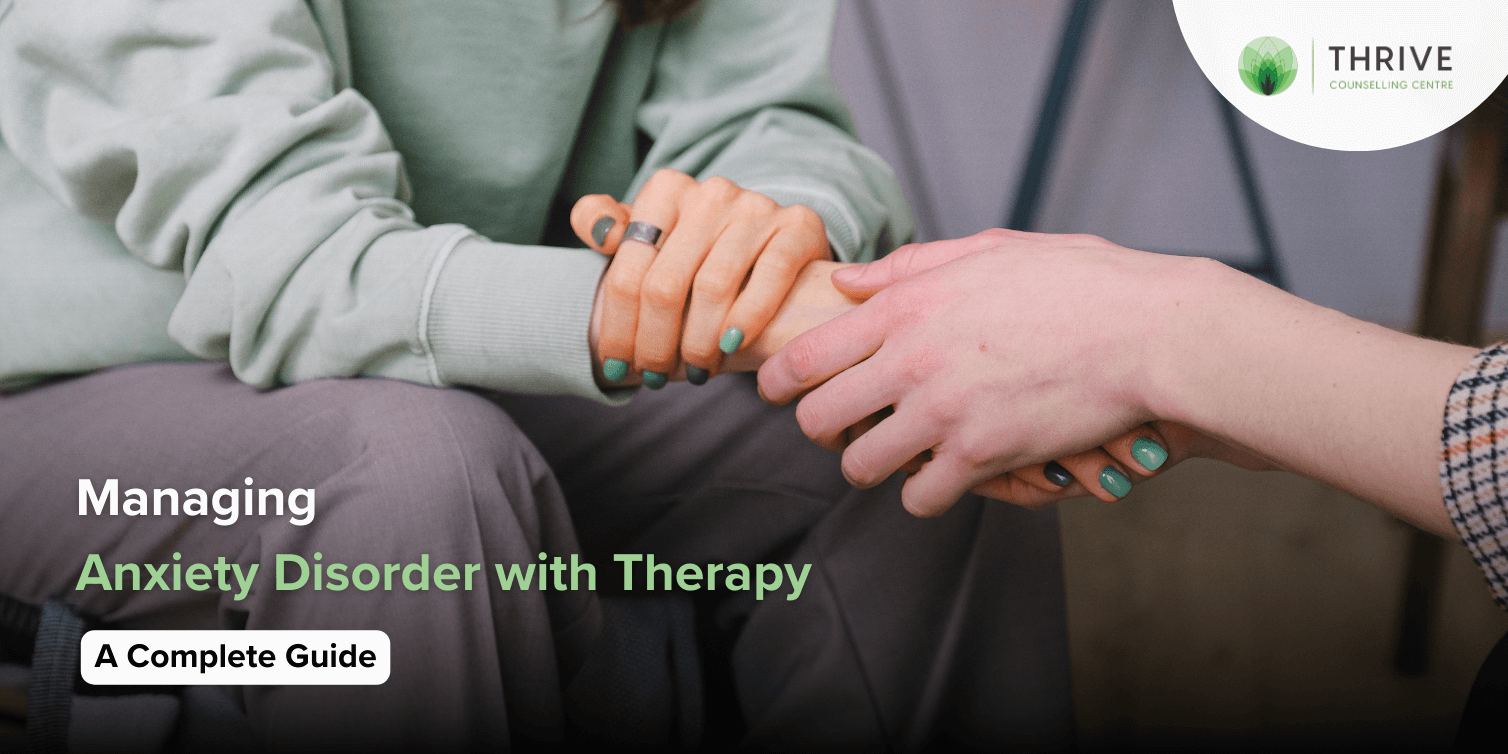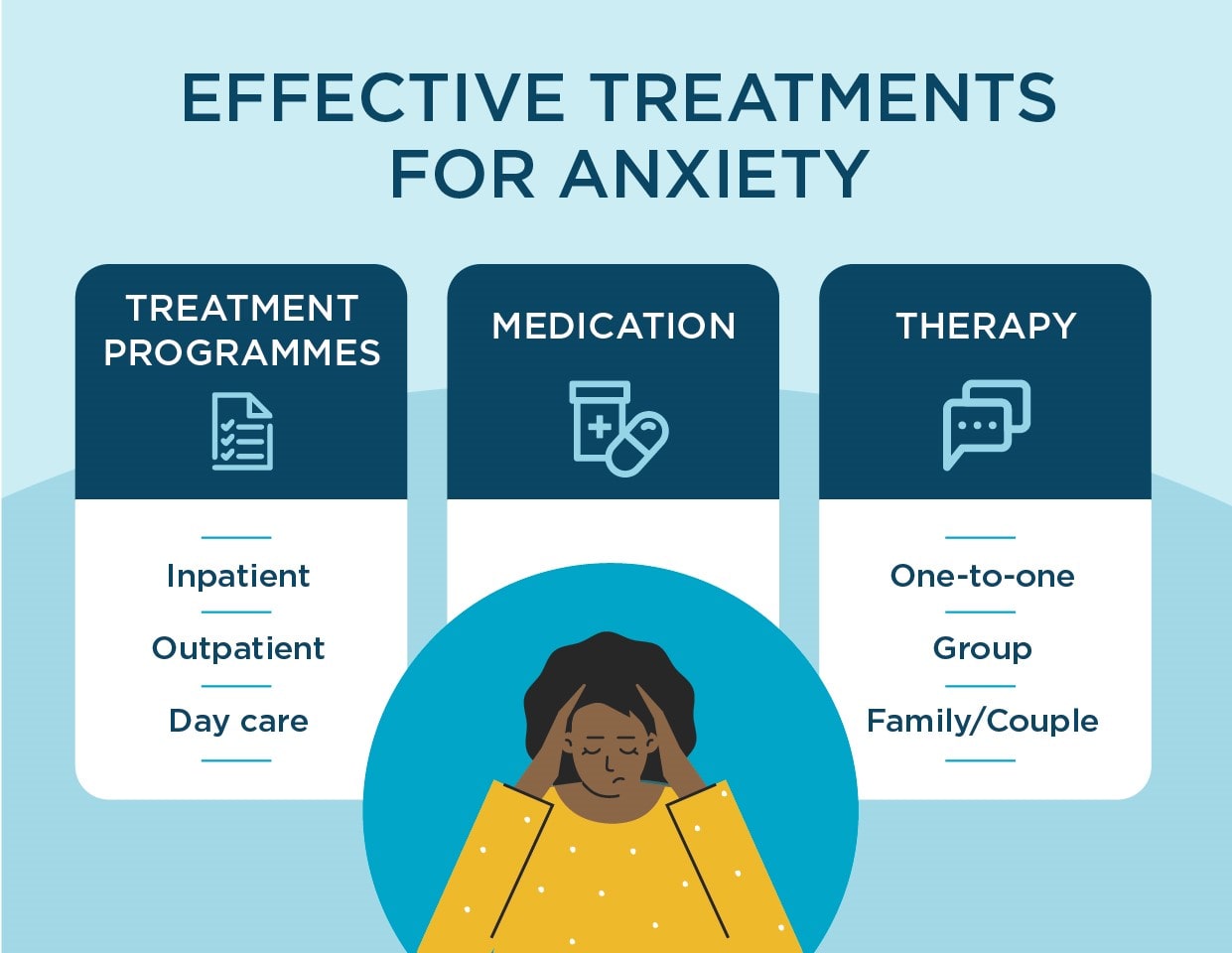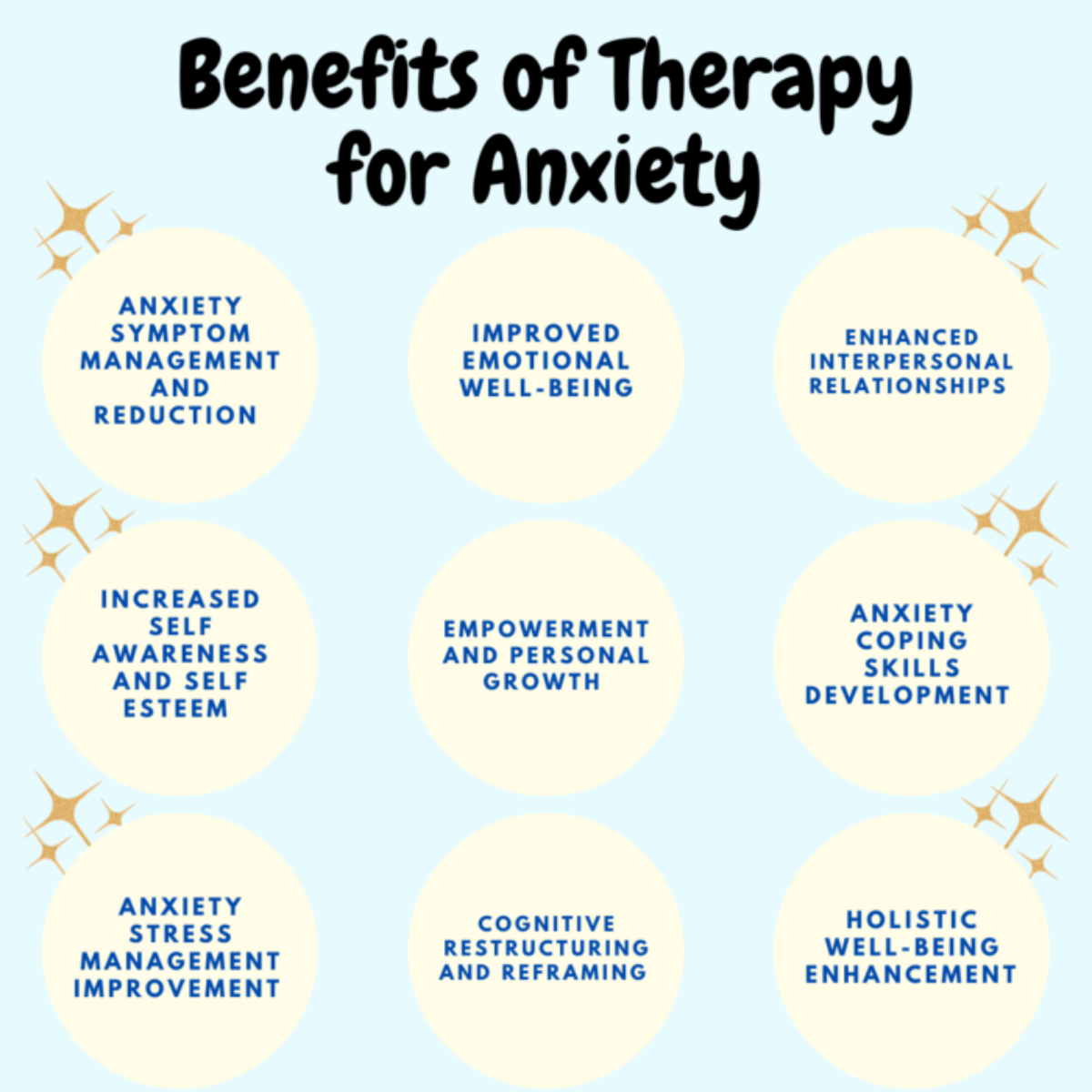Individual counselling for anxiety sessions that change lives
Exploring Different Methods in Coaching for Stress And Anxiety Disorder for Lasting Change
When dealing with anxiety problems, it's necessary to discover a range of therapy techniques. Each method provides one-of-a-kind insights and devices to assist you manage your symptoms successfully. You could locate that integrating methods can produce the very best results. Understanding the nuances of these methods is crucial to promoting long lasting adjustment. What happens if the right combination could release a new level of emotional health for you?
Comprehending Stress And Anxiety Problems: A Brief Overview
Stress and anxiety problems, which affect countless individuals worldwide, can significantly affect life. You could experience frustrating feelings of fear or fret that seem uncontrollable. These sensations can cause physical signs like an auto racing heart, sweating, and even dizziness. Common sorts of stress and anxiety disorders include generalised anxiety problem, panic attack, and social anxiousness disorder. Each has special signs, however they all share a tendency to disrupt your regular and relationships.Understanding the origin of your anxiousness is vital. It could come from genetics, brain chemistry, or life experiences. Recognizing your triggers can assist you manage your actions much better. It's essential to bear in mind that you're not the only one in this battle. Several people encounter comparable challenges, and looking for help is a solid step towards feeling better. By discovering anxiousness disorders, you're already on the course to understanding and handling your condition better.
Cognitive-Behavioral Therapy: Testing Negative Thought Patterns
In Cognitive-Behavioral Treatment, you'll begin by determining the adverse idea sets off that add to your anxiety. You'll function on changing them with even more positive alternatives once you recognize these ideas. Together, you'll build effective coping techniques to help manage your anxiety in day-to-day circumstances.
Determining Unfavorable Thought Triggers

Identifying the specific triggers behind your negative thoughts can be important in managing anxiety when you encounter moments of distress. Beginning by paying attention to situations that provoke sensations of fear or fear. Is it a congested area, an approaching due date, or a conversation with certain people? Write down these circumstances in a journal. This will help you identify patterns in your reasoning. Likewise, notice physical sensations that accompany your adverse ideas, like an auto racing heart or tightness in your chest. By identifying these triggers, you acquire understanding right into what's fueling your stress and anxiety. Comprehending these links is the initial step in challenging those ideas and inevitably reclaiming control over your psychological feedbacks.
Changing Thoughts With Positives
Challenging adverse thought patterns is a necessary step in changing your attitude and decreasing stress and anxiety. You might frequently locate on your own trapped in cycles of self-doubt or tragic thinking. As opposed to letting these ideas determine your sensations, practice changing them with reasonable alternatives or favorable affirmations. For example, when you assume, "I can't handle this," change it to, "I can handle challenges one action at a time." This basic adjustment can substantially impact your emotional state. Consistently identifying and responding to these adverse ideas aids develop a much healthier internal dialogue. Keep in mind, it takes some time and initiative, yet continually exercising this strategy can lead to lasting change, empowering you to face stress and anxiety with renewed confidence and durability.
Structure Coping Strategies Together
Replacing negative thoughts is just the start of handling stress and anxiety successfully. To produce long lasting change, you require to construct coping approaches that encourage you. Cognitive-Behavioral Treatment (CBT) assists you recognize and test those purposeless thought patterns. With each other, you and your therapist can explore exactly how these ideas influence your feelings and behaviors.Start by establishing useful techniques, like journaling or mindfulness exercises, that permit you to face anxiety head-on. When you encounter your concerns slowly, you'll learn to respond differently.

Mindfulness and Acceptance-Based Approaches: Cultivating Present-Moment Recognition
As you navigate the intricacies of anxiety, integrating mindfulness and acceptance-based approaches can substantially enhance your capability to grow present-moment understanding. By concentrating on the present moment, you'll find that you can observe your thoughts and sensations without judgment (Counseling services for anxiety). This practice assists you recognize your stress and anxiety without really feeling overwhelmed by it.Engaging in mindfulness workouts, such as deep breathing, body scans, or guided reflections, permits you to ground yourself in your current experience. Acceptance-based approaches urge you to accept your feelings instead of fight versus them. They shed their power over you.Incorporating these techniques into your everyday regimen can transform just how you respond to anxiety when you accept your sensations. You'll establish strength and discover to navigate difficult situations with better ease. Eventually, cultivating present-moment awareness lays the foundation for lasting adjustment, equipping you to lead a much more meeting life
Direct Exposure Treatment: Challenging Anxieties Slowly
Direct exposure treatment assists you face your anxieties in a steady way, making it less overwhelming. You'll discover methods to encounter anxiety-provoking situations step by step, while likewise building coping techniques to manage your reactions. This approach empowers you to take control and reduce anxiety in time.
Progressive Exposure Methods

When facing anxiety, gradually confronting your anxieties can be an effective means to gain back control. This strategy, recognized as steady direct exposure, involves slowly revealing on your own to the scenarios or things that activate your anxiousness. Beginning with less challenging circumstances and progressively work your way approximately even more difficult ones. If you're worried of public speaking, you could begin by talking in official source front of a mirror, after that progress to sharing ideas with a pal, and eventually resolve a little group. Each action aids desensitize you to the worry, constructing your confidence gradually. Remember, it's important to speed on your own and commemorate tiny victories as you move via this process, strengthening your capacity to manage stress and anxiety effectively.
Building Coping Techniques
Structure efficient coping approaches is important for taking care of stress and anxiety, specifically as you confront your concerns progressively - Counseling services for anxiety. One powerful method is direct exposure treatment, where you start by facing your worries in a controlled way. Begin with less intimidating scenarios and gradually function your method approximately even more difficult situations. This progressive exposure helps desensitize you to stress and anxiety sets off, making them less overwhelming.Incorporate relaxation strategies, such as deep breathing or mindfulness, to calm your mind throughout direct exposure. Track your progress, commemorating tiny victories along the way to increase your confidence. Bear in mind, it's all right to take your time; the objective isn't excellence but consistent renovation. By building these techniques, you'll equip yourself to navigate stress and anxiety and welcome life more fully
Psychodynamic Therapy: Uncovering Source of Anxiety
Psychodynamic therapy discovers the subconscious mind, exposing the origin of your stress and anxiety. By examining your ideas, feelings, and previous experiences, this technique helps you reveal underlying disputes and unresolved concerns that may add to your present anxiety. You'll function with a specialist to examine childhood years experiences, connections, and emotional patterns that form your actions today.As you gain understanding into these much deeper layers of your psyche, you'll begin to acknowledge how previous events affect your present actions. This understanding can cause catharsis, allowing you to refine emotions you might have suppressed.Through the restorative connection, you can additionally determine defense reaction that might have developed gradually, using a more clear path to transform. Ultimately, psychodynamic treatment equips you with the tools to resolve your anxiety at its core, advertising lasting improvement imp source in your emotional wellness.
Holistic and integrative Strategies: Combining Methods for Greater Efficacy
Integrating different healing methods can boost your journey towards managing stress and anxiety better. By combining components from cognitive-behavioral therapy, mindfulness techniques, and holistic techniques, you can develop a tailored strategy that addresses your distinct requirements. For circumstances, you could use cognitive-behavioral techniques to challenge unfavorable thought patterns while integrating mindfulness workouts to ground on your own in today moment.Additionally, discovering all natural techniques such as yoga exercise or reflection can promote leisure and reduce stress and anxiety signs. This blend enables you to develop greater self-awareness and resilience.Experimenting with these varied approaches can aid you find what resonates most with you. Remember, it has to do with finding a harmony that works, as opposed to adhering to a solitary technique. This integrative method not only offers immediate alleviation however also cultivates lasting skills for managing anxiousness, encouraging you to recover control over your life.
The Role of Assistance Solutions: Building Strength With Link
While it might seem that taking care of anxiousness is a solitary trip, having a strong assistance system can play an important duty in your durability. Surrounding on your own with empathetic buddies, family, or assistance groups develops a safe room where you can freely share your sensations and experiences. When you connect with others, you advise yourself that you're not the only one in this struggle.These connections provide support and can supply useful coping techniques that have actually helped others. It's additionally a chance to acquire point of view; pals can assist you see situations in different ways, reducing feelings of isolation.Moreover, psychological support cultivates a sense of belonging, which can considerably alleviate stress and anxiety signs and symptoms. By leaning on your support go to this website group, you can develop resilience and tackle difficulties better. Keep in mind, connecting for assistance suggests stamina, and it can make all the distinction in your trip towards managing anxiety.
Frequently Asked Concerns
What Are the Typical Signs And Symptoms of Anxiousness Disorders?
You might experience restlessness, tiredness, trouble concentrating, irritation, muscular tissue stress, and rest disruptions. Physical signs and symptoms can consist of quick heart beat, sweating, and shivering. Identifying these indicators early can help you seek appropriate support and treatment.
How Long Does Treatment Usually Last for Anxiousness Problems?
Therapy for anxiety conditions typically lasts anywhere from a couple of weeks to numerous months. It actually depends on your private requirements, development, and the methods your therapist uses to help you manage your anxiousness properly.
Can Medicine Be Utilized Alongside Therapy for Anxiety?
Yes, drug can certainly be made use of along with treatment for anxiousness. Integrating both methods typically improves treatment performance, assisting you manage symptoms while discovering underlying concerns with counseling (Counseling services for anxiety). Constantly consult your medical care copyright for personalized advice
Exist Self-Help Methods for Handling Anxiousness?
Yes, there are a number of self-help strategies for taking care of stress and anxiety. You can exercise mindfulness, involve in routine exercise, keep a balanced diet regimen, develop a routine, and make use of deep breathing methods to help in reducing anxiety signs efficiently.
Just how Do I Know if I Need Specialist Help for Stress And Anxiety?
